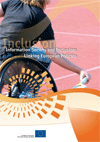 The Lisbon Council in 2000 agreed to make a decisive impact on the eradication of poverty and social exclusion by 2010. Building a more inclusive European Union is an essential element in achieving the Union's ten year strategic goal of sustained economic growth, more and better jobs and greater social cohesion. Member States coordinate their policies for combating poverty and social exclusion on the basis of a process of policy exchanges and mutual learning known as the Open Method of Coordination (OMC). Their National Action Plans against poverty and social exclusion set out concrete steps to improve access to ICT and the opportunities new technologies can provide. New Member States have outlined their key challenges in the area of eInclusion in their Joint Inclusion Memorandum.
The Lisbon Council in 2000 agreed to make a decisive impact on the eradication of poverty and social exclusion by 2010. Building a more inclusive European Union is an essential element in achieving the Union's ten year strategic goal of sustained economic growth, more and better jobs and greater social cohesion. Member States coordinate their policies for combating poverty and social exclusion on the basis of a process of policy exchanges and mutual learning known as the Open Method of Coordination (OMC). Their National Action Plans against poverty and social exclusion set out concrete steps to improve access to ICT and the opportunities new technologies can provide. New Member States have outlined their key challenges in the area of eInclusion in their Joint Inclusion Memorandum.
From 2006, three policy areas provide the framework for this process:
- Eradicating poverty and social exclusion.
- Adequate and sustainable pensions in the light of accelerated demographic ageing.
- Accessible, high quality and sustainable health and longterm care.
Promoting an inclusive information society in Europe is one of the three key pillars of the i2010 strategy, the European Information Society for Growth and Jobs. i2010 proposes a wide range of measures for harnessing the potential of ICT to promote inclusion, deliver better public services and improve quality of life. Among many other measures, i2010 plans to launch a flagship initiative in 2007 on Independent Living for the Ageing Society, and to work towards a European eInclusion initiative for 2008.
Member States commitment to the eInclusion agenda was evident at a high-level meeting in Riga (Latvia) in June 2006, which brought together ministers from 34 European countries. They endorsed a pan-European drive to use ICT to help people to overcome economic, social, educational, territorial or disability-related disadvantages. eInclusion targets agreed by ministers include halving the gap in internet usage by groups at risk of exclusion, boosting broadband coverage in Europe to at least 90%, stepping up actions to reduce gaps in digital literacy and e-skills by 2008, and making all public websites accessible by 2010.
This brochure is an illustration of how innovation in ICT is contributing to an inclusive knowledge-based economy and society.
Download "Information Society and Inclusion: Linking European Policies" brochure (.pdf, 556KB).
For further information, please visit: DG Information Society - Unit "ICT for Inclusion"
Related news article: